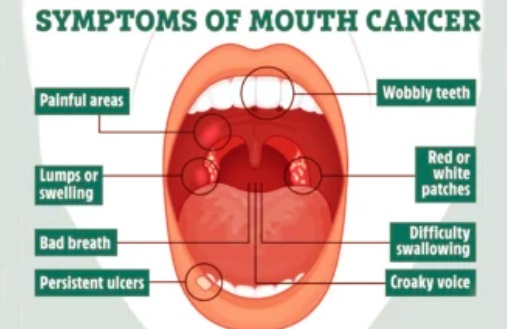Medical Researchers in Thailand Discover that EBV Induced LINC00944 Plays a Key Role in Oral Cancer Progression
Nikhil Prasad Fact checked by:Thailand Medical News Team Feb 03, 2025 2 months, 2 weeks, 18 hours, 27 minutes ago
Medical Thailand: Researchers Uncover How Epstein Barr Virus Alters Cancer Growth
Scientists from Khon Kaen University in Thailand have made a significant discovery regarding oral cancer progression. Their study reveals that Epstein-Barr virus (EBV) influences a particular long non-coding RNA known as LINC00944, which plays a crucial role in promoting oral cancer cell migration and invasion while also impacting immune cell differentiation. This
Medical Thailand news report delves into the key findings of the study, shedding light on how EBV-induced LINC00944 contributes to cancer progression and its potential implications for future treatments.
 Medical Researchers in Thailand Discover that EBV Induced LINC00944 Plays a Key Role
Medical Researchers in Thailand Discover that EBV Induced LINC00944 Plays a Key Role
in Oral Cancer Progression
Unraveling the Connection Between EBV and Oral Cancer
Oral squamous cell carcinoma (OSCC) is one of the most prevalent forms of head and neck cancer, often linked to risk factors such as tobacco, alcohol, and viral infections. The Epstein-Barr virus, a well-known cause of various malignancies, has now been found to play a direct role in oral cancer development through the activation of LINC00944. The research team analyzed data from head and neck squamous cell carcinoma (HNSCC) tissue samples and observed a significant increase in LINC00944 expression in EBV-positive cancer cells compared to normal tissues.
Further laboratory experiments demonstrated that oral cancer cell lines infected with EBV exhibited a marked upregulation of LINC00944. When researchers artificially increased the expression of LINC00944 in cancer cells, they noted a significant enhancement in the cells’ ability to migrate and invade surrounding tissues. These findings suggest that LINC00944 acts as a driver of cancer progression, potentially contributing to the aggressive nature of EBV-associated oral cancers.
The Role of LINC00944 in Enhancing Tumor Spread
To investigate how LINC00944 influences tumor progression, the scientists conducted wound healing and transwell assays on oral cancer cells. Their results showed that cells with elevated LINC00944 levels closed artificial wounds more rapidly and demonstrated increased invasiveness. This suggests that the presence of LINC00944 in EBV-infected cells plays a crucial role in enhancing cancer cell motility and promoting tumor metastasis.
Another significant discovery was the ability of LINC00944 to be secreted into the surrounding cellular environment. When oral cancer cells overexpressing LINC00944 were grown in culture, they released this molecule into the medium. Neighboring cancer cells were able to take up LINC00944, indicating a potential mechanism through which EBV-related cancers spread more aggressively.
LINC00944 Influences Immune Cell Behavior
Apart from its role in cancer cell invasion, LINC00944 was found to affect the immune system, particularly macrophage differentiation. Macrophages are immune cells that can either promote or suppress tumor growth depending on their activation state. The study demonstrated that LINC00944 promotes macrophage polarization towa
rd the M1 phenotype, which is traditionally associated with inflammatory responses. However, in the context of cancer, M1 macrophages can sometimes contribute to a tumor-supportive environment, creating a complex interplay between cancer progression and the immune system.
When human monocyte-derived macrophages (THP-1 cells) were exposed to conditioned medium from LINC00944-overexpressing oral cancer cells, they displayed a shift toward the M1 phenotype. Specific markers associated with M1 macrophages, such as CD80, CXCL9, and CXCL10, were significantly upregulated, indicating that LINC00944 directly influences immune cell behavior. This suggests that EBV not only promotes cancer cell aggression but also manipulates the immune system in ways that could benefit tumor growth.
LINC00944 Interacts with Key Cancer Pathways
The researchers also explored how LINC00944 interacts with other molecular pathways involved in cancer progression. They found that LINC00944 targets specific microRNAs (miRNAs) known to regulate critical cancer-related genes, particularly those involved in the NF-κB signaling pathway. NF-κB is a well-established driver of cancer-related inflammation and is known to support tumor survival and metastasis.
The study identified several miRNAs that are typically downregulated in oral cancer, including miR-26a, miR-125b, and miR-506. LINC00944 appears to interact with these miRNAs, preventing them from suppressing cancer-promoting genes such as NFKB1 and RELA. This interaction further amplifies cancer progression by enhancing inflammation and tumor-supportive signaling pathways.
Implications for Future Cancer Research and Therapy
The discovery of LINC00944’s role in EBV-associated oral cancer progression opens new possibilities for therapeutic interventions. Targeting LINC00944 or its downstream signaling pathways could provide a novel approach for treating aggressive oral cancers linked to EBV infection. Future research will be needed to explore whether inhibiting LINC00944 expression can slow cancer progression or improve responses to existing treatments.
Additionally, understanding the interaction between EBV, LINC00944, and immune cells could lead to the development of immunotherapy strategies that aim to counteract the virus-driven changes in the tumor microenvironment. By disrupting the influence of LINC00944 on macrophage differentiation, researchers may be able to reduce the immune system’s support for tumor growth and improve patient outcomes.
Conclusion
The study provides compelling evidence that EBV-induced LINC00944 is a critical factor in oral cancer progression. Through its ability to enhance cancer cell migration, invasion, and immune modulation, LINC00944 represents a promising target for further investigation. As researchers continue to explore its role in cancer biology, new therapeutic strategies may emerge to combat EBV-associated malignancies.
The study findings were published in the peer-reviewed journal: Cancers.
https://www.mdpi.com/2072-6694/17/3/491
For the latest on
Medical Thailand Research works, keep on logging to Thailand Medical News.
Read Also:
https://www.thailandmedical.news/news/breakthrough-research-on-exosomes-and-their-role-in-oral-cancer
https://www.thailandmedical.news/news/potential-role-of-herbs-and-phytochemicals-in-treating-oral-cancer
https://www.thailandmedical.news/news/dutch-study-uncovers-role-of-tumor-infiltrating-b-cells-in-oral-cancer-prognosis
https://www.thailandmedical.news/news/thailand-medical-researchers-study-seaweed-caulerpa-lentillifera-for-oral-cancer-treatments
https://www.thailandmedical.news/news/thailand-medical-study-unveils-betaine-s-anti-cancer-potential-in-oral-cancer
https://www.thailandmedical.news/news/solanine-a-promising-ally-in-the-fight-against-drug-resistant-oral-cancer
https://www.thailandmedical.news/articles/medical-thailand
